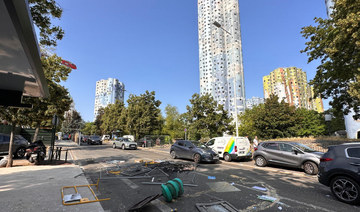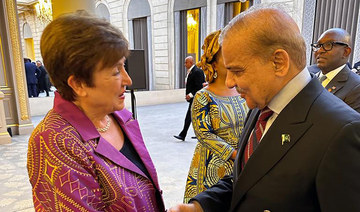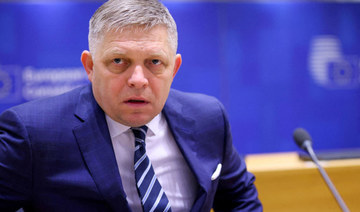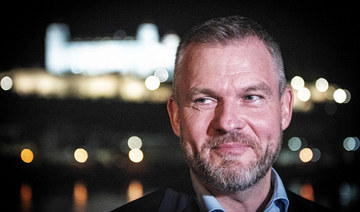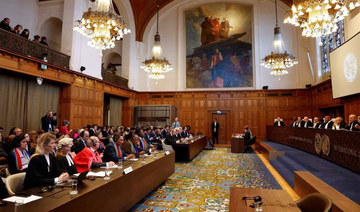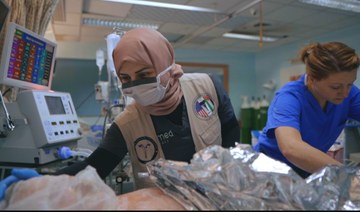NANTERRE, France: French President Emmanuel Macron is urging parents to keep teenagers at home to quell rioting spreading across France and says social media are fueling copycat violence.
After a second crisis meeting with senior ministers, Macron said Friday that social media are playing a “considerable role” in the spreading unrest triggered by the deadly police shooting of a 17-year-old.
He said he wants social media such as Snapchat and TikTok to remove sensitive content and said that violence is being organized online. Of young rioters, he said: “We sometimes have the feeling that some of them are living in the streets the video games that have intoxicated them.”
Protesters erected barricades, lit fires and shot fireworks at police, who responded with tear gas and water cannons in French streets overnight as tensions grew over the deadly police shooting of a 17-year-old that has shocked the nation. More than 875 people were arrested and at least 200 police officers injured as the government struggled to restore order on a third night of unrest.
Armored police vehicles rammed through the charred remains of cars that had been flipped and set ablaze in the northwestern Paris suburb of Nanterre, where a police officer shot the teen identified only by his first name, Nahel. A relative of the teen said his family is of Algerian descent. Nahel will be buried Saturday, according to Nanterre Mayor Patrick Jarry, who said the country needs to “push for changes” in disadvantaged neighborhoods.
“There’s a feeling of injustice in many residents’ minds, whether it’s about school achievement, getting a job, access to culture, housing and other life issues … I believe we are in that moment when we need to face the urgency (of the situation),” he said.
The unrest extended as far as Belgium’s capital, Brussels, where about a dozen people were detained during scuffles related to the shooting in France and several fires were brought under control.
In several Paris neighborhoods, groups of people hurled firecrackers at security forces. The police station in the city’s 12th district was attacked, while some shops were looted along Rivoli street, near the Louvre museum, and at the Forum des Halles, the largest shopping mall in central Paris.
In the Mediterranean port city of Marseille, police sought to disperse violent groups in the city center, regional authorities said.
Similar incidents broke out in dozens of towns and cities across France.
Some 40,000 police officers were deployed to quell the protests. National police said a total of 875 people were detained overnight, including 408 in the Paris region alone.
Around 200 police officers were injured, according to a national police spokesperson. No information was available about injuries among the rest of the population.
Interior Minister Gerald Darmanin on Friday denounced what he called a night of “rare violence.” His office described the arrests as a sharp increase on previous operations as part of an overall government effort to be “extremely firm” with rioters.
The French government has stopped short of declaring a state of emergency — a measure taken to quell weeks of rioting around France that followed the accidental death of two boys fleeing police in 2005. Yet Prime Minister Elisabeth Borne suggested Friday the option is being considered.
President Emmanuel Macron left early from an EU summit in Brussels, where France plays a major role in European policymaking, to return to Paris and hold an emergency security meeting Friday.
The German government on Friday said it’s monitoring the unrest in France “with some concern” but that it was up to French authorities and the public there to tackle the issue.
The police officer accused of pulling the trigger Tuesday was handed a preliminary charge of voluntary homicide after prosecutor Pascal Prache said his initial investigation led him to conclude “the conditions for the legal use of the weapon were not met.” Preliminary charges mean investigating magistrates strongly suspect wrongdoing but need to investigate more before sending a case to trial.
The shooting, captured on video, shocked France and stirred up long-simmering tensions between police and young people in housing projects and other disadvantaged neighborhoods.
The detained police officer’s lawyer, speaking on French TV channel BFMTV, said the officer was sorry and “devastated.” The officer did what he thought was necessary in the moment, attorney Laurent-Franck Lienard told the news outlet.
“He doesn’t get up in the morning to kill people,” Lienard said of the officer, whose name has not been released under French practice in criminal cases. “He really didn’t want to kill.”
Prache, the Nanterre prosecutor, said officers tried to stop Nahel because he looked so young and was driving a Mercedes with Polish license plates in a bus lane. He allegedly ran a red light to avoid being stopped and then got stuck in traffic.
The officer who fired the shot said he feared he and his colleague or someone else could be hit by the car as Nahel attempted to flee, according to Prache.
Nahel’s mother, identified as Mounia M., told France 5 television that she is angry at the officer who killed her only child, but not at the police in general. “He saw a little, Arab-looking kid, he wanted to take his life,” she said, adding that justice should be “very firm.”
“A police officer cannot take his gun and fire at our children, take our children’s lives,” she said.
Nahel’s grandmother, who was not identified by name, told Algerian television Ennahar TV that her family has roots in Algeria.
Algeria’s foreign affairs ministry said in a statement Thursday that grief is widely shared in the North African country.
Anti-racism activists renewed complaints about police behavior.
“We have to go beyond saying that things need to calm down,” said Dominique Sopo, head of the campaign group SOS Racisme. “The issue here is how do we make it so that we have a police force that when they see Blacks and Arabs, don’t tend to shout at them, use racist terms against them and in some cases, shoot them in the head.”
Race was a taboo topic for decades in France, which is officially committed to a doctrine of colorblind universalism. But some increasingly vocal groups argue that this consensus conceals widespread discrimination and racism.
Deadly use of firearms is less common in France than in the United States, although 13 people who didn’t comply with traffic stops were fatally shot by French police last year. This year, another three people, including Nahel, have died under similar circumstances. The deaths have prompted demands for more accountability in France, which also saw protests against racial injustice after George Floyd’s killing by police in Minnesota.
The protests in France’s suburbs echoed 2005, when the deaths of 15-year-old Bouna Traoré and 17-year-old Zyed Benna led to three weeks of riots, exposing anger and resentment in neglected housing projects. The boys were electrocuted after hiding from police in a power substation in Clichy-sous-Bois.
In Geneva, the UN human rights office said it was concerned by the teen’s killing and the subsequent violence and urged that allegations of disproportionate use of force by authorities in quelling the unrest be swiftly investigated.
“This is a moment for the country to seriously address the deep issues of racism and racial discrimination in law enforcement,” spokesperson Ravina Shamdasani told reporters.
Shamdasani said the UN Committee on the Elimination of Racial Discrimination expressed concern in December about “the frequent use of identity checks, discriminatory stops, the application of criminal fixed fines imposed by the police or law enforcement agencies, that they said disproportionately targets members of certain minority groups.”
French president urges parents to keep teens at home to quell rioting spreading across France
https://arab.news/g7vmf
French president urges parents to keep teens at home to quell rioting spreading across France
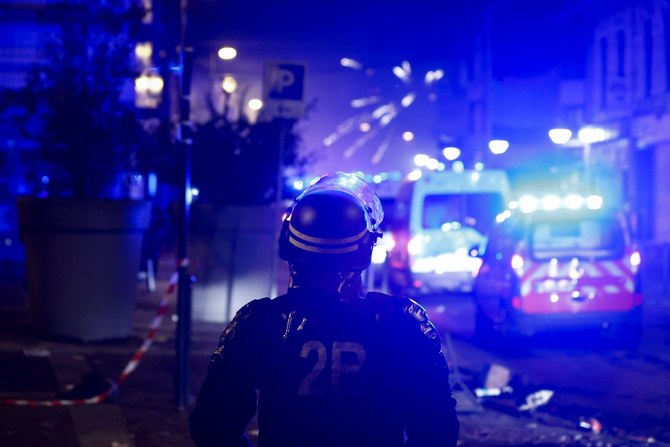
- The fiery protests that continued early Friday morning were the third consecutive night of protests
- The teen who is only being identified by his first name, Nahel, was shot and killed by police in the Paris suburb of Nanterre on Wednesday
Slovak PM Fico no longer in life-threatening condition after being shot, minister says

- The assassination attempt happened while Fico visited the central Slovak town of Handlova
- Slovak media say the shooter is a 71-year-old man, and Fico's Cabinet saud it was politically motivated
BANSKA BYSTRICA, Slovakia: Slovak Prime Minister Robert Fico is no longer in a life-threatening condition after he was shot in an assassination attempt when leaving a government meeting on Wednesday, a government minister said.
The gunman shot Fico, 59, five times, initially leaving the prime minister in critical condition and undergoing surgery hours later on Wednesday evening.
“I was very shocked ... fortunately as far as I know the operation went well — and I guess in the end he will survive ... he’s not in a life-threatening situation at this moment,” Slovak Deputy Prime Minister and Environment Minister Tomas Taraba told the BBC’s Newshour.
Taraba said one bullet went through Fico’s stomach and a second hit a joint.
News outlet Aktuality.sk cited an unnamed source saying Fico was out of surgery and in stable condition.
Defense Minister Robert Kalinak told a news briefing hours earlier that Fico had suffered “serious polytrauma” after several shot wounds.
Interior Minister Matus Sutaj Estok had said earlier that Fico was in a life-threatening condition while he remained in the operating room.
“This assassination (attempt) was politically motivated and the perpetrator’s decision was born closely after the presidential election,” Sutaj Estok said, referring to an April election won by a Fico ally, Peter Pellegrini.
The shooting in the central Slovak town of Handlova, which Slovak media said was carried out by a 71-year-old man, stunned the small central European nation and drew international condemnation.
Slovakia, a member of NATO and the European Union, has little history of political violence. Russian President Vladimir Putin and US President Joe Biden joined Slovakia’s EU partners in expressing shock and condemnation of the shooting.
The country of 5.4 million has seen polarized political debate in recent years, including the hard-fought presidential election last month that helped tighten Fico’s grip on power.
Since returning as prime minister last October, Fico has shifted policy quickly. Opposition critics call it a power grab.
His government has scaled back support for Ukraine while opening dialogue with Russia, sought to weaken punishments for corruption and dismantled a special prosecutor’s office, and is revamping the RTVS public broadcaster despite calls to protect media freedom.
Fico has long been critical of Slovakia’s mainstream media, refusing to speak to some outlets. Members of his party blasted media and opposition actions in recent months.
“I ask all to stop piling attacks, expressions of hate, on social networks, in the media, which are aimed at that or another political camp, regardless if it concerns the (government) coalition or the opposition,” Sutaj Estok said.
After the attack, Fico was rushed to hospital in Handlova where he had been chairing a government meeting. He was then transported by helicopter to regional capital Banska Bystrica for urgent treatment, it said, adding that his condition was too serious for him to be taken to Bratislava.
A Reuters witness heard shots as Fico exited a building to shake hands with a crowd of people who had been waiting to greet him. Police then wrestled a man to the ground.
Slovak news media reported the shooter was a former security guard at a shopping mall, an author of three collections of poetry and a member of the Slovak Society of Writers. News outlet Aktuality.sk cited his son as saying his father was the legal holder of a gun license.
“I have absolutely no idea what my father intended, what he planned, what happened,” it quoted the son as saying.
Broadcaster TA3 reported the leftist prime minister had been hit in the abdomen in the attack.
“I don’t think I will wake up from this,” 66-year-old Lubica Valkova told reporters on the scene. “This kind of thing just can’t happen in Slovakia.”
Veteran leader
Fico, a dominant force in Slovakia for two decades, has drawn criticism for taking a more pro-Russian stance in the Ukraine war.
Describing the shooting as a “monstrous” crime, Putin said in a telegram sent to Slovakia’s President Zuzana Caputova: “I know Robert Fico as a courageous and strong-minded man. I very much hope that these qualities will help him to survive this difficult situation.”
Biden offered US help to Slovakia, saying in a statement: “We condemn this horrific act of violence.”
Slovakia’s biggest opposition party Progressive Slovakia called off a planned protest and called for restraint to avoid escalating tensions. Parliament suspended debate indefinitely after the attack.
In his career, Fico has moved between the pro-European mainstream and nationalistic positions opposed to EU and US policies. He has also shown a willingness to change course depending on public opinion or changed political realities.
An admirer of Hungary’s Prime Minister Viktor Orban, Fico has grown increasingly critical of Western support for Ukraine in its war with invading Russian forces.
Fico was forced to resign as premier amid mass protests in 2018 triggered by the contract killing of Jan Kuciak, a journalist who had been investigating high-level corruption. Those protests exacerbated divisions in Slovak society that still linger.
Putin arrives in China for state visit in a show of unity between the authoritarian allies

- On the eve of the visit, Putin told Chinese media that the Kremlin is prepared to negotiate over the conflict in Ukraine
- Ukrainian president has said any negotiations must include a restoration of Ukraine’s territorial integrity and withdrawal of Russian troops
BEIJING: Russia’s President Vladimir Putin landed Thursday in Beijing for a two-day state visit to China, in a show of unity between the authoritarian allies as Moscow presses forward with a new offensive in Ukraine.
Putin’s visit comes as Russia has become more economically dependent on China following Moscow’s full-scale invasion of Ukraine more than two years ago.
On the eve of the visit, Putin said in an interview with Chinese media that the Kremlin is prepared to negotiate over the conflict in Ukraine. “We are open to a dialogue on Ukraine, but such negotiations must take into account the interests of all countries involved in the conflict, including ours,” Putin was quoted as saying by the official Xinhua News Agency.
The Russian leader’s two-day trip comes as his country’s forces have pressed an offensive in northeastern Ukraine’s Kharkiv region that began last week in the most significant border incursion since the full-scale invasion began, forcing almost 8,000 people to flee their homes.
Along with Moscow’s efforts to build on its gains in the nearby Donetsk region, the 2-year-old war has entered a critical stage for Ukraine’s depleted military that is awaiting new supplies of anti-aircraft missiles and artillery shells from the United States.
“We have never refused to negotiate,” Putin was quoted as saying by Xinhua. “We are seeking a comprehensive, sustainable and just settlement of this conflict through peaceful means. We are open to a dialogue on Ukraine, but such negotiations must take into account the interests of all countries involved in the conflict, including ours.”
Ukrainian President Volodymyr Zelensky has said any negotiations must include a restoration of Ukraine’s territorial integrity, the withdrawal of Russian troops, the release of all prisoners, a tribunal for those responsible for the aggression, and security guarantees for Ukraine.
China claims to take a neutral position in the conflict, but has backed Moscow’s contentions that Russia was provoked into attacking Ukraine by the West, despite Putin’s public avowals of his desire to restore Russia’s century-old borders as the reason for his assault.
Putin has blamed the West for the failure of negotiations in the opening weeks of the war and praised China’s peace plan for Ukraine that would allow Moscow to cement its territorial gains.
“Beijing proposes practicable and constructive steps to achieve peace by refraining from pursuing vested interests and constant escalation of tensions, minimizing the negative impact of the conflict on the global economy,” he had said.
Putin said a Chinese proposal in 2023, which Ukraine and the West rejected, could “lay the groundwork for a political and diplomatic process that would take into account Russia’s security concerns and contribute to achieving a long-term and sustainable peace.”
The Kremlin said in a statement that during their talks this week, Putin and Chinese leader Xi Jinping will “have a detailed discussion on the entire range of issues related to the comprehensive partnership and strategic cooperation and determine the new directions for further development of cooperation between Russia and China and also have a detailed exchange of opinions on the most acute international and regional issues.”
The visit furthers the effort by China and Russia to topple the US-led Western democratic order in favor of a more authoritarian model that crushes political opposition, human rights and freedom of speech. Putin began a fifth term in office this month.
Speaking Tuesday in the upper house of Russian parliament, Foreign Minister Sergey Lavrov said Moscow and Beijing are “objectively interested in maintaining our lead in efforts to establish a more fair and democratic world order.”
“Russia and China aren’t alone in their efforts to reform an international system and help establish a multipolar global order,” he said.
Lavrov noted that the “duet of Moscow and Beijing plays a major balancing role in global affairs,” adding that “the Russian president’s forthcoming visit to (China) will strengthen our joint work.”
Moscow has forged increasingly close ties with Beijing as the war has dragged into a third year, diverting the bulk of its energy exports to China and relying on Chinese companies for importing high-tech components for Russian military industries to circumvent Western sanctions.
The Russia-China military ties have also strengthened. They have held a series of joint war games in recent years, including naval drills and patrols by long-range bombers over the Sea of Japan and the East China Sea. Russian and Chinese ground forces also have deployed to the other country’s territory for joint drills.
China remains a major market for Russian military, while also massively expanding its domestic defensive industries, including building aircraft carriers and nuclear submarines.
Putin has previously said that Russia has been sharing highly sensitive military technologies with China that helped significantly bolster its defense capability. In October 2019, he mentioned that Russia was helping China to develop an early warning system to spot ballistic missile launches — a system involving ground-based radar and satellites that only Russia and the US possessed.
South Africa seeks halt to Israel’s Rafah offensive at World Court

- The hearings on May 16 and 17 will only focus on issuing emergency measures, to keep the dispute from escalating
THE HAGUE: South Africa will ask the top UN court on Thursday to order a halt to the Rafah offensive as part of its case in The Hague accusing Israel of genocide in the Gaza Strip.
The hearings at the International Court of Justice, also known as the World Court, come after South Africa last week asked for additional emergency measures to protect Rafah, a southern Gaza city where more than a million Palestinians have been sheltering.
It also asked the court to order Israel to allow unimpeded access to Gaza for UN officials, organizations providing humanitarian aid, and journalists and investigators. It added that Israel has so far ignored and violated earlier court orders.
On Thursday, South Africa will present its latest intervention seeking emergency measures starting at 3 p.m.(1300 GMT).
Israel, which has denounced South Africa’s claim that it is violating the 1949 Genocide Convention as baseless, will respond on Friday. In previous filings it stressed it had stepped up efforts to get humanitarian aid into Gaza as the ICJ had ordered.
Gilad Erdan, Israel’s ambassador to the United Nations told Army Radio on Wednesday the short notice the court gave for the hearings did not allow sufficient legal preparation, adding that was “a telling sign.”
The Israel-Hamas war has killed nearly 35,000 people in Gaza, according to health authorities there. About 1,200 people were killed in Israel and 253 taken hostage on Oct. 7 when Hamas launched the attack that started the war, according Israeli tallies.
South Africa accuses Israel of acts of genocide against Palestinians. In January, the court ordered Israel to ensure its troops commit no genocidal acts against Palestinians in Gaza, allow in more humanitarian aid and preserve any evidence of violations.
The hearings on May 16 and 17 will only focus on issuing emergency measures, to keep the dispute from escalating. It will likely take years before the court can rule on the merits of the case.
The ICJ’s rulings and orders are binding and without appeal. While the court has no way to enforce them, an order against a country could hurt its international reputation and set legal precedent.
India says it is working to repatriate UN staffer killed in Gaza

- Waibhav Anil Kale, who was working with the UN Department of Safety and Security, and was killed while heading to the European Hospital in Rafah along with a colleague, who was wounded in the incident
NEW DELHI: India said on Wednesday it was working to repatriate the body of a former Indian Army officer serving as a UN staffer, who was killed in Gaza when his vehicle was hit by what the UN said was tank fire in Rafah where only Israeli tanks are present.
The staffer, Waibhav Anil Kale, was working with the UN Department of Safety and Security and was heading to the European Hospital in Rafah along with a colleague, who was wounded in the incident. The UN said he was the first international UN staffer killed in Gaza since the war began on Oct. 7, taking the total UN death toll to 191.
UN Secretary General’s deputy spokesperson Farhan Haq said on Tuesday the UN had set up a fact-finding panel to determine the responsibility for Kale’s death.
“It’s very early in the investigation, and details of the incident are still being verified with the Israeli Defense Force,” he told a press cconference. Asked by reporters about the shots fired on the vehicle, he said, “we believe it came from a tank in the area” and later added, it was “safe” to assume that only the IDF tanks in that region. There are 71 international UN staff members in Gaza currently, he said. The IDF said in a statement on Monday that the incident was “under review” and the IDF had not been made aware of the vehicle’s route. But an initial inquiry indicated that “the vehicle was hit in an area declared an active combat zone.”
The Hamas-run government’s media office accused Israel of “deliberately targeting foreign staff in the Gaza Strip.”
India’s Foreign Ministry said its diplomatic missions were “in touch with relevant authorities” on the investigation into Kale’s death, and helping to bring home his body.
In a statement on Monday after Kale’s death, UN Secretary General Antonio Guterres reiterated an “urgent appeal for an immediate humanitarian ceasefire and for the release of all hostages,” saying the conflict in Gaza was continuing to take a heavy toll “not only on civilians, but also on humanitarian workers.” He has demanded explanations for all their deaths.
ICC ‘excited’ as cricket’s newest stadium launched in New York

- Thirty-four thousand-capacity stadium will host hotly-anticipated India-Pakistan clash on June 9
- Stadium features infrastructure from Las Vegas Formula 1 circuit, drop-in pitches prepared in Florida
NEW DELHI: The newly-built Nassau County International Cricket Stadium, near New York, was launched on Wednesday with the sport’s world body “excited” to conquer new territories through the T20 World Cup in June.
The 34,000-capacity stadium, with infrastructure from the Las Vegas Formula 1 circuit and drop-in pitches prepared in Florida, will host the hotly-anticipated India-Pakistan clash on June 9, among its eight scheduled World Cup games.
The showpiece 20-over event will be co-hosted by the West Indies and the United States starting June 1 with New York, Florida and Dallas as venues.
The International Cricket Council (ICC) remains happy with the focus on the India-Pakistan clash and the Nassau project as part of bringing the game to the US.
“Yeah, absolutely! We can run that game anywhere and the interest in the fixture would be immense,” Chris Tetley, the ICC’s head of events, told reporters in a media roundtable.
“The news stories that we have seen and the media coverage in the US itself as well as among the cricket media around the world. I have not seen that before around an ICC event.”
Tetley added: “We are really excited to bring the T20 World Cup cricket to the US and the opportunity that it presents to the sport and from what I can see there is an audience really waiting for us to come.”
T20 Cricket will also feature as one of five new sports at the Los Angeles Olympics in 2028.
Making a cricket stadium in Nassau remained a huge challenge for the ICC, who got in Adelaide Oval curator Damian Hough for the job.
Hough created the first drop-in pitch in Adelaide in 2013 and the latest strips at the Nassau County ground promise good cricket and balance between bat and ball.
“People shouldn’t be concerned about drop-in pitches,” said Hough.
“They are proven around the world, definitely in Australia. Some of the best cricket is played on drop-in pitches and are really successful.”



